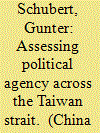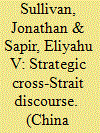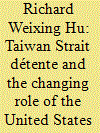| Srl | Item |
| 1 |
ID:
119218


|
|
|
|
|
| Publication |
2013.
|
| Summary/Abstract |
The migration of Taiwanese to the Chinese mainland is one of the most striking features of the deepening interaction and integration across the Taiwan Strait. Among these newcomers, Taiwanese businesspeople (taishang) have long since been considered an important 'linkage community' that profoundly affects the dynamics of cross-Strait relations. However, to what extent can and do they exert political agency in cross-Strait relations? Drawing on recent literature, as well as fieldwork conducted between 2006 and 2009 in Taiwan, the Pearl River Delta (Dongguan), and the Kunshan-Shanghai metropolitan area, this article begins by analysing the political mindset of the taishang, most notably with respect to their understanding of themselves as political actors. It then looks at different dimensions of political agency exercised by the taishang in both China and Taiwan. Since little is known about their strategies to politically safeguard their group-specific interests, the findings and assessments presented here can only be preliminary. Nevertheless, the article contributes to a better understanding of the concept of linkage community and provides a useful foundation for further investigations of the taishang's political role in shaping cross-Strait relations.
|
|
|
|
|
|
|
|
|
|
|
|
|
|
|
|
| 2 |
ID:
119219


|
|
|
|
|
| Publication |
2013.
|
| Summary/Abstract |
This article looks at Ciji (Tzu Chi), a Taiwanese Buddhist charity which has been active in China since 1991. Ciji's presence in China is all the more remarkable in view of outbreaks of crises in relations across the Taiwan Strait as well as the religious nature of the organization. The article first addresses the issue of Taiwan's soft power in its relations with China and suggests the possibility that Ciji's activities in Taiwan have shown China the benefits of a liberal policy towards religion in that charitable activities carried out by religious organizations complement the government's social policies. The second section chronicles Ciji's presence in China since 1991 and shows that local governments have their own reasons for welcoming Ciji's volunteers. The third section compares and contrasts state approaches in China and Taiwan with respect to the provision of social services by religious organizations and notes that even if local governments in China are learning about the benefits of a more open policy in their dealings with Ciji, the central government has not adopted the liberal approach of the Taiwanese government in the regulation of religion.
|
|
|
|
|
|
|
|
|
|
|
|
|
|
|
|
| 3 |
ID:
119215


|
|
|
|
|
| Publication |
2013.
|
| Summary/Abstract |
After more than half a century's separation, interaction between China and Taiwan has increased and has progressively changed from a politico-economic interaction to a more civic interaction. Scholars working on cross-Strait relations have recently begun to pay attention to the civic influence of Taiwanese businesses on the relationship. Some emphasize the importance of sub-governmental interactions in the process of cross-Strait integration. Others assert that Taiwanese businesses can exercise economic leverage to constrain the Chinese government in cross-Strait policymaking. These scholars stress bottom-up processes by observing current phenomena, then deducing the emerging pattern of cross-Strait relations that may be influenced by business activities. Taking account of changing trends in scholarly discussions of the cross-Strait relationship, this special issue of China Information presents current research in this field. Unlike studies on top-down processes that affect political and economic interactions between China and Taiwan, several contributions in the special issue highlight bottom-up mechanisms affecting such interactions by examining the identity of Taiwanese businesspeople and migrants, as well as the activities and implications of Taiwanese charitable organizations operating in China. This issue focuses not only on the impact of China on Taiwan, but also the impact of Taiwanese investments, migrants, and exports on Chinese society.
|
|
|
|
|
|
|
|
|
|
|
|
|
|
|
|
| 4 |
ID:
119216


|
|
|
|
|
| Publication |
2013.
|
| Summary/Abstract |
Republic of China presidents Chen Shuibian and Ma Yingjiu have espoused substantially varied positions at different times on cross-Strait relations. Given the prominence of the presidents' rhetoric in an otherwise relatively stable relationship, these discursive fluctuations have been a cause of consternation and curiosity for observers of the cross-Strait relationship. However, their behaviour is consistent with democratic politics in general (issues and policy stances evolve and emerge, and political actors must engage and appeal to a wide range of stakeholders with varied agendas) and in terms of the growing influence of distinct sectors (such as big business) within Taiwan. This article puts forward a method for analysing this variation across three presidential terms, namely Chen's first and second term and Ma's first term. How does the content of both presidents' public pronouncements develop over time? How does the content of their discourse vary according to the strategic context of the constituency they are addressing? What does this reveal about the strategy and strategic relationships behind presidential rhetoric in Taiwan? In addressing these questions, the article contributes a quantitative perspective to existing work on political discourse in Taiwan and to the growing methodological and applied literature on how to systematically analyse Chinese political text.
|
|
|
|
|
|
|
|
|
|
|
|
|
|
|
|
| 5 |
ID:
119217


|
|
|
|
|
| Publication |
2013.
|
| Summary/Abstract |
Détente in the Taiwan Strait has raised questions about the United States' role in future cross-Strait relations. On the one hand, Washington welcomes and encourages peaceful interactions across the Taiwan Strait. On the other hand, however, it is increasingly concerned about Beijing gaining more control of the dynamics and direction of future cross-Strait relations. As some US analysts suggest, if Taiwan drifts towards closer relations with China, Washington has to reconsider its national interests. US anxiety over Taiwan is further aggravated by its perception of a rising and more assertive China in the Asia-Pacific region, as reflected by the emerging debate on US Taiwan policy and its overall strategy towards China. The role of the United States in cross-Strait relations is undergoing some adjustments as Washington 'pivots' its strategic focus to Asia and as its relations with China become more salient in its Asian policy. In the long run the rivalry between Washington and Beijing in Asia would eventually have a negative bearing on cross-Strait relations.
|
|
|
|
|
|
|
|
|
|
|
|
|
|
|
|
| 6 |
ID:
119220


|
|
|
|
|
| Publication |
2013.
|
| Summary/Abstract |
While much research on migration and China focuses on the overseas Chinese, this research will instead analyse the migration of Taiwanese to China. This article uses data gathered in Dongguan and Shanghai in 2004-5 with follow-up interviews in 2008-10 to study the migration experiences of Taiwanese in China and to illustrate how class affects the migration of the privileged. Despite the diverse backgrounds of the female respondents considered in this article, most of them had a higher socio-economic status than the Chinese people they encountered. Because of the difference in social class, the respondents were reluctant to mix with locals. The ensuing sense of alienation has partly caused the respondents to identify themselves as less Chinese than before moving to China.
|
|
|
|
|
|
|
|
|
|
|
|
|
|
|
|